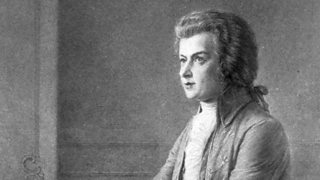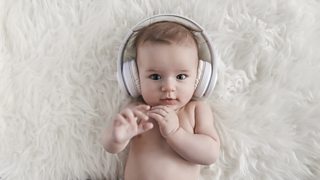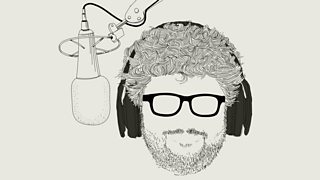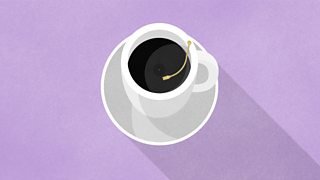Why do babies love music so much?
Whether it's nursery rhymes, Mozart, Queen or Baby Shark, most babies are captivated by music. But what is it about these tunes that they're enjoying? Are all babies born musical? Where does their musicality come from (and when)? And can music really affect their development?
With a ba and a pa and a wheeeeeoooo, Tom Service is on a mission to find out. Here’s some of the things we learned from this special edition of The Listening Service. Boop boop!
Our relationship with music starts long before we’re born
Tom meets Dr Laurel Trainor, an expert on musical development in children and adults, who reveals how babies can start to hear the world around them months before birth. We learn not only that babies’ auditory systems function from the sixth prenatal month, but babies actually start to form musical memories while still inside the womb. Hear more in this fact-packed clip.

What can babies hear in the womb?
Some of our earliest music lessons are learned before we're even born.
Music is an active experience for babies – and parents should get involved
“From their earliest days, infants are trying to engage actively in music,” says Trainor. “As soon as they can start making responses, they do. Certainly towards the end of the first year, you can see overt signs that they are trying to engage in the music by singing along, clapping, and moving their bodies.”

So what can parents do to help their children develop musically? They can start by getting stuck in. Trainor’s research has revealed measurably different outcomes for children who engage with their parents in a music group, as opposed to those whose experience of music is merely passive.
“The infants in active engagement music classes show superior early language learning,” she says. “They’re socially more advanced, easier to soothe, and smile more than children [who are] just exposed to passive music listening.”
However, the so-called ‘Mozart effect’ probably doesn’t exist
The idea that Mozart’s music in particular is hard-wired to make kids brainier is both popular and pervasive. But before you spend a fortune on downloads, listen to this.
“A number of years ago, there were some studies published that suggested that the music of Mozart was special and enhanced cognition, especially spatial cognition,” says Trainor. “Unfortunately, there doesn't seem to be much evidence for this.” The cognitive boost we get from music is much more likely to be to do with mood, not genre. And it doesn’t matter whether you’re playing Mozart, Mahler or The Monkees.
“If you play any music that people like and is happy, it gives an immediate boost to cognitive performance,” says Trainor. “Probably what was measured in that initial study is that if you play something that's energetic and happy, we basically get better immediately at everything we're doing."

So don’t get hung up on the soundtrack to playtime. Babies have neither the ability nor the motivation to differentiate between genres – unlike adults, who invariably insist on doing so, often to their detriment.
We know quite a lot about the kind of music that babies prefer
Babies are stimulated most by music with a fast tempo that mimics their heart rates (which are much faster than those of adults). They also respond positively to rhythmic regularity and musical repetition. So while there’s nothing special about Mozart, there’s no doubt that some of his faster numbers would hit a junior audience’s sweet spot.
So, is there such a thing as the perfect baby listening experience? In 2016, psychologists at Goldsmiths College teamed up with the singer-songwriter Imogen Heap to develop a mood-enhancing track for babies. They surveyed 2,300 parents and found that the sounds most likely to make infants happy included sneezing (51%), animal noises (23%) and baby laughter (28%).
The resulting track, The Happy Song, features all of these things – plus raspberries, rhythmic plosive sounds (like pa and ba) and that nippy tempo that babies love so much.
The universal power of the lullaby
Not all baby music is about stimulation and happiness. In fact, there’s a whole realm of music that’s designed to destimulate babies. Going back still further, we see that humans have been using this music to modify children’s moods and behaviours throughout history.

Lullabies have been used for thousands of years to soothe children to sleep. And, as far as we can tell, they’re universal to all cultures. As Trainor explains: “Infants are really bad at controlling their state. They rely on caregivers to help them control their state, to calm them down when they’re tired and need to sleep.” That’s as true of infants now as it was for those 5,000 years ago in Ancient Mesopotamia.
The science suggests that music of a slow tempo, with free movement and little change or surprise, turns off pain receptors in our brains to prepare us for sleep. “The lullaby is not usually just an auditory experience – it's really a multi-sensory experience,” adds Trainor. “Typically when you sing a lullaby... you're also holding and rocking the baby. The baby is getting simultaneous rhythmic information from the lullaby AND from the rocking.”
Tom Service explores the fascinating art and science of writing music for tiny people in a special episode of The Listening Service. Subscribe now on Βι¶ΉΤΌΕΔ Sounds.
-
![]()
The Listening Service
Tom Service presents a journey of imagination and insight the the podcast that explores how music works.
-
![]()
Six mind-expanding music podcasts to download this year
Escape the algorithm with six podcasts that will help you discover new sounds, build better playlists and generally see the world that little bit differently.
-
![]()
This Classical Life
Up your playlisting game with a hugely diverse range of music from Jess Gillam and friends.
-
![]()
Classical Fix
Clemmie Burton-Hill mixes classical playlists for music-loving guests. If you fancy giving classical music a go, start here.





